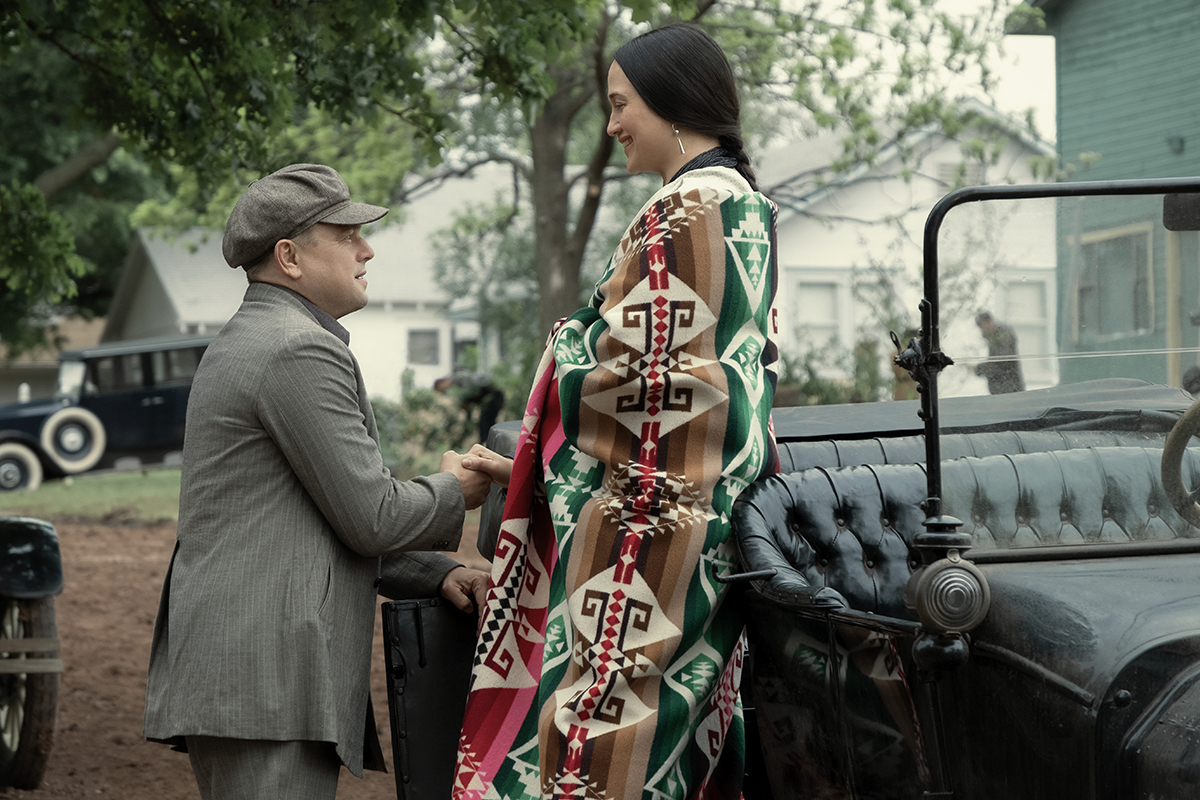‘Killers of the Flower Moon’ Is Not a Love Story

When you see a charming and smiley performance from Leonardo DiCaprio, it is easy to be roped in. In many ways, that is the point of his casting as Ernest Burkhart in Killers of the Flower Moon.
From the start, Mollie (Lily Gladstone) knows that he’s not that smart but says that he is handsome and wants money and to be stable. She is aware of his intentions but thinks that there is a love there that she can cherish. What she doesn’t see is the evil lurking in Ernest, fed by his uncle and the men around him. The beauty of Martin Scorsese and Eric Roth’s script for Killers of the Flower Moon is that while Ernest may believe in some warped way that he loves Mollie, the movie shows us time and time again that this is not a love story between them.
**Spoilers ahead for Killers of the Flower Moon**
Mollie, an Osage woman who had wealth and her own home, was living with her mother and seemed content being unmarried until Ernest came into her life and ruined everything. We learn at the end that she remarried after she left Ernest, and Mollie does draw the line when Ernest openly lies to her time and time again. What I think is fascinating about Killers of the Flower Moon comes from its ability to show how Mollie could see love in Ernest while also showing how he could be so evil and hide all the pain he was inflicting upon her.
At the end of it all, Ernest tries to say that he always loved his wife, but when you look at what he did to her on paper, that isn’t love. That’s a greedy man willing to kill to take what he thinks he deserves. Killing someone you claim to “love” for greed negates the love part of that ideal, and Killers of the Flower Moon drives that home in its final moments between Ernest and Mollie, forcing him to lie to her yet again when she asks what he put in her insulin.
Ernest may think that’s love, but it isn’t
Ernest and Mollie’s “love” story works because you can never quite figure out how DiCaprio is playing Ernest. Does he actually love her? Is he playing an angle for his uncle’s bigger plans? Mollie is always in it for her love of Ernest and even asks if he still loves her at one point. We can see moments when he does things that surprise Uncle, and he isn’t quite sure what Ernest is up to with Mollie. Their dynamic baffles everyone. It is what makes the outcome of everything around them so tragic.
Most of the white men of Fairfax use the Osage women for their money. But sometimes, it seems as if Ernest may actually love Mollie, even though their relationship was built on that mutual understanding. Scorsese and Roth let us believe that there is a love there, and Gladstone’s performance of Mollie pairs incredibly well with DiCaprio’s Ernest and his inability to stand up for himself in any way. It makes for one of the more dynamic parts of the movie as a whole and one that has you on the edge of your seat throughout, especially by the end in one of the tensest parts of the film. But it is also important to note that this all boils down to one important fact: Ernest Burkhart is not a man who genuinely loves Mollie.
What he’s showing her is not love, no matter what he tells himself. Whether it is how he’s justifying what he’s doing to her and her family or just a way for him to feel better about his black soul, Ernest is a man who is not loving. Everything he does to Mollie is the opposite of what an actual caring, doting husband would do.
Killers of the Flower Moon isn’t selling us a love story
One of the things about this movie that is worth noting is that I don’t think Martin Scorsese or Eric Roth ever set out to sell these marriages as having love on both sides. Every white man in the movie is depicted exactly as they are: A wolf in sheep’s clothing. These men preyed on the wealth of the Osage women. They’d flock to their doors, charm them, and marry them, all with the hopes of taking that money for themselves. Their hearts were not in it. They did not marry them for love. Whatever Ernest’s intentions were at the start, his idea of “love” isn’t that. He let King and all the men around him sway him into nearly murdering his wife.
Ernest was a willing participant in the murder of his “beloved” wife’s family, and the movie doesn’t hide that fact. Yes, the movie’s version of Ernest may have sat on the stand and said that he loved his wife and married her because of that love, but Killers of the Flower Moon and those involved in its creation do not sell this as a love story, nor should they. Ernest Burkhart, and what he did to Mollie and her family, wasn’t love—it was evil.
(featured image: Paramount Pictures/Apple Original Films)
Have a tip we should know? tips@themarysue.com